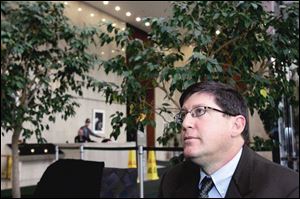
Company meets with Toledo over Wi-Fi service plan
3/13/2007
From left, Val Brooks and M.J. Hill, surveillance specialists for Buckeye CableSystems, monitor its network from a control room. The local company has been in business since 1965.

From left, Val Brooks and M.J. Hill, surveillance specialists for Buckeye CableSystems, monitor its network from a control room. The local company has been in business since 1965.
Toledo took another step yesterday toward Mayor Carty Finkbeiner's goal of allowing city residents free access to the Internet from their favorite coffee shop or park or the comfort of their back deck.
Three representatives from a California-based wireless network provider met with city officials to discuss their proposal for covering the entire city with Wi-Fi.
Chuck Haas, president and chief operating officer for MetroFi, and two others from his company spent the morning discussing their proposal with, among others, Toledo Chief Information Officer Patsy Scott.
The city has not yet met with the other company that responded to a request for Wi-Fi proposals - Toledo-based Buckeye CableSystem.
Officials from both Buckeye - which like The Blade is owned by Block Communications Inc., - and the city said no meetings between the two are scheduled.

Chuck Haas, co-founder and chief executive of MetroFi, describes his discussions with Toledo officials positively. It was a great meeting, and we look forward to coming to Toledo, he said.
"I don't know," Ms. Scott said when asked if the city will meet with Buckeye to discuss its proposal. "[Buckeye's proposal] is very short, and it really didn't respond to the RFP [Request For Proposal] we put out."
Upon hearing of Ms. Scott's statement, Joe Jensen, Buckeye's executive vice president and chief technical officer, said he took solace in the fact that at least MetroFi did not meet the requirements laid out in the city's RFP, either.
But to Mr. Jensen's dismay, Ms. Scott said she felt MetroFi's offer was in line with what Mayor Finkbeiner called for during a public presentation in January.
"They're offering to provide free Wi-Fi for citizens and city operations," she said. "There are revenue expectations, but the city doesn't have to commit."
Mr. Jensen's response?
"That just doesn't jibe," he said.
Mayor Finkbeiner called for a company to make Wi-Fi available throughout Toledo's 88 square miles, and to do so at no charge to the city.
He asked for a network that would provide free wireless Internet service to city agencies, such as police and fire departments; free wireless access in certain public buildings and outdoor areas, and discounted wireless Internet service for low-income city residents.
MetroFi, which is based in Mountain View, Calif., and has about 50 employees, drafted a proposal that meets some of the mayor's requirements, but falls short on others.
MetroFi would enable Toledoans to receive advertisement-supported Internet access at a download speed of 1.0 Megabit per second at no charge.
A MetroFi customer who didn't want to view the ads could purchase uninterrupted network access at the same download speed for $19.95 per month.
But the California company's proposal requires the city to pay at least $2.2 million, and up to $4.3 million over five years for Metrofi to provide Toledo with an enhanced public safety system - a 2.4/4.9 GigaHertz system - which would allow for a secure, complex network available to police, fire, and other governmental departments.
The $2.2 million low estimate would be charged for a 2.4 GHz system supporting the free, ad-based network Wi-Fi network.
Ms. Scott said there were ways Toledo could defray its costs, such as dumping some current communications equipment in favor of a Wi-Fi service, or benefiting from the amount of Web advertisers MetroFi finds in this area.
Ben Zifrony, vice president of sales and business for MetroFi, said Toledo could find other entities, such as hospitals and state or federal agencies, to pay to use the 4.9 GHz public safety system to recoup the city's costs.
But Mr. Zifrony also said advertising revenues would only count toward the 2.4 GHz system.
"I would like to see how [Toledo] would justify not going out for a rebid if they really feel MetroFi matched their request," Mr. Jensen said.
But the issue for city residents, Buckeye officials say, is cost and speed.
Buckeye has developed a high-speed, fiber-optic network that covers some 2,200 miles in northwest Ohio. Buckeye spokesman Tom Dawson said the company invested upward of $100 million to build its high-speed network, a process which began in 1997 and took more than four years to complete.
For $69.99 per month, Buckeye customers can purchase cable modem speeds of up to 10.0 Mbps, which is about 150 times faster than an average dial-up connection.
By comparison, the free Internet service MetroFi offers is for a download speed of up to 1.0 Mbps, which is 10 times slower than Buckeye's fastest speeds.
Anyone who wishes to purchase MetroFi network access at Buckeye cable speeds (up to 10.0 Mbps) could pay a flat monthly fee of $350, provided they agree to view ads.
Otherwise, customers looking for Wi-Fi speeds of 1.5, 3.0, 5.0, or 10.0 Mbps could pay anywhere from $399 to $1,699 monthly, depending on the desired download speed.
The increased Wi-Fi costs, quoted by MetroFi, are required because the firm would have to install special equipment on top of a customer's home.
Buckeye Cable's proposal is light on details, but company officials said the brevity of the offer was by design.
The Toledo company proposed that a meeting take place between the city and company to further pinpoint the city's Wi-Fi needs before prices are discussed.
Buckeye roughly estimated the cost of building a citywide Wi-Fi network as between $11 million and $17.6 million.
"We're just not sure how much [Wi-Fi] use there is in a [Toledo] public park," Mr. Dawson said. "In the first place, you don't use it in December. Secondly, do you want to fight the bugs in the summertime? And third, can you see the [laptop] screen in the sunlight?"
"I just don't know that there's a lot of demand. Those are the kinds of things we'd like to explore with the city," Mr. Dawson said.
Buckeye said in its proposal that it currently provides Wi-Fi service at nearly 40 Toledo-area locations, including all Toledo-Lucas County Public Library branches, some YMCA facilities, and Fifth Third Field.
Buckeye subscribers have free Wi-Fi access at all of those locations, while nonsubscribers can pay hourly, daily, or monthly rates.
The Toledo company, in business in South Toledo since 1965 with 600 employees, said it has already secured the necessary government permits to deploy a Wi-Fi system in the city.
Mr. Jensen said yesterday that Buckeye has recently agreed to provide Wi-Fi at 15 Burger King locations in the Toledo area, at no charge to customers who will use the network.
He said Buckeye was looking forward to further discussing Wi-Fi expansion with the city, but it sounds like that discussion might not happen.
"We were more than happy to sit down and work through something with them," Mr. Jensen said.
"But if the city feels it needs to go to California to get the expertise and support they need, that's their decision."
As for the negotiations that are ongoing between the city and MetroFi, both sides said the talks were still in the early stages.
But MetroFi's Mr. Haas said he felt positive about yesterday's meeting before he left Toledo.
"It was a great meeting, and we look forward to coming to Toledo," Mr. Haas said. "I expect the city to move fairly quickly on its decision."
Since it was established in 2002, MetroFi has either constructed, or is in the process of building, wireless networks in 10 cities, including Aurora, Ill., and Santa Clara, Calif.
The company has also submitted proposals to several other cities.
Contact Joe Vardon
at jvardon@theblade.com
or 419-410-5055.